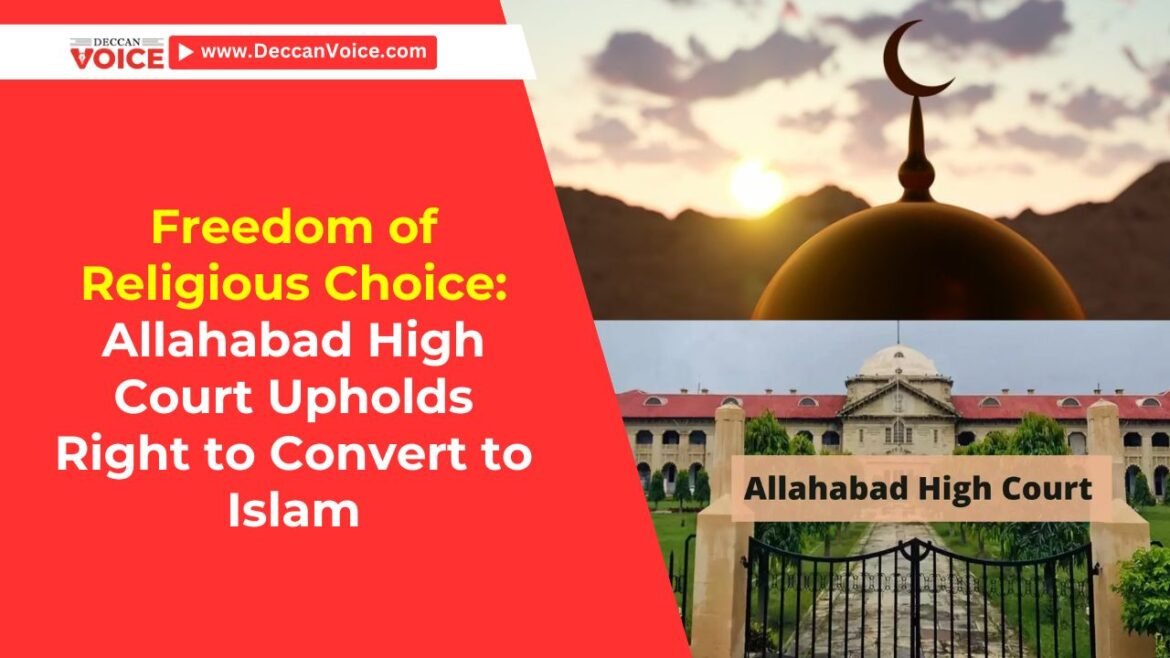Table of Contents
Freedom of Religion: Allahabad High Court Upholds Right to Convert to Islam
In a landmark ruling, the Allahabad High Court reaffirmed the constitutional right of individuals to convert to Islam out of their free will, emphasizing that such conversions are bona fide as long as they are done by adults of sound mind, driven by genuine faith and belief. The court’s observation is a significant step in protecting religious freedom in India, countering the rising narrative that portrays religious conversions as forced or politically motivated.
Conversion as a Matter of Personal Choice
The ruling stated that an individual embracing Islam is considered genuine if they:
Are a legal adult – Meaning they have the right to make their own decisions without external interference.
Are of sound mind – Ensuring that their choice is rational and not under pressure.
Convert based on faith and belief – Specifically in the “oneness of God (Allah)” and the “prophetic character of Muhammad (PBUH).”
This ruling directly challenges the growing attempts to criminalize religious conversions under the guise of “forced conversions.” It upholds the essence of Article 25 of the Indian Constitution, which guarantees every citizen the right to freely profess, practice, and propagate their religion.
The Rising Debate Over Religious Conversions in India
Religious conversion, especially to Islam and Christianity, has been a contentious issue in India, with right-wing groups often alleging that conversions are forced or done for material gains. Several states, including Uttar Pradesh and Madhya Pradesh, have enacted anti-conversion laws that place unnecessary restrictions on individuals who wish to change their faith.
However, the Allahabad High Court’s ruling makes it clear that conversion should not be viewed through a political or communal lens. If an individual converts based on genuine belief, it is their fundamental right, and any attempt to suppress that right would be unconstitutional.
Double Standards in Religious Conversions
While conversions to Islam and Christianity are often met with suspicion and legal hurdles, ghar wapsi (re-conversion to Hinduism) is openly encouraged by Hindutva groups. This exposes the hypocrisy of those who selectively oppose conversions, using it as a political tool rather than a genuine concern for individual rights.
If religious conversion is wrong, why is it celebrated when people reconvert to Hinduism? If embracing Islam or Christianity is seen as a “threat,” then what about the coercive tactics used to bring Dalits and tribals back into the Hindu fold? These double standards expose the real agenda behind the so-called fight against forced conversions.
Constitutional Rights Must Prevail
The Allahabad High Court’s verdict is a much-needed reminder that India is a secular democracy, not a theocracy. Every citizen has the right to explore different faiths and choose one that aligns with their beliefs.
Any attempt to restrict this right—whether by political pressure, legal hurdles, or social ostracization—goes against the core values of India’s Constitution. The court’s ruling should serve as a precedent to counter the growing intolerance against religious minorities and uphold the fundamental right of freedom of conscience.
In a diverse country like India, true religious harmony can only be achieved when faith remains a personal choice, not a political battleground.



